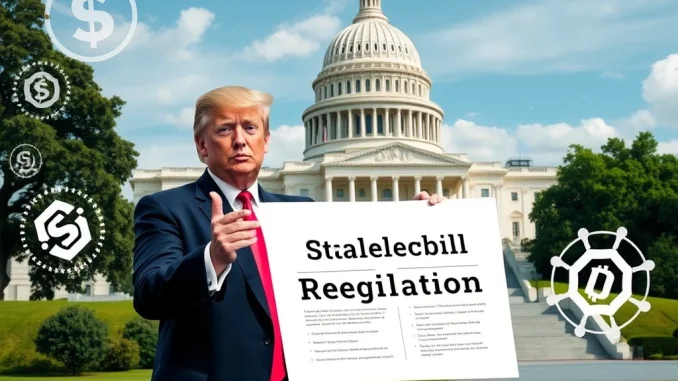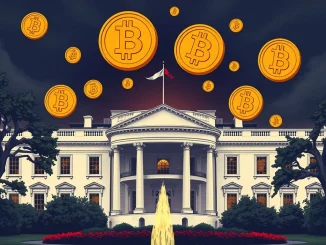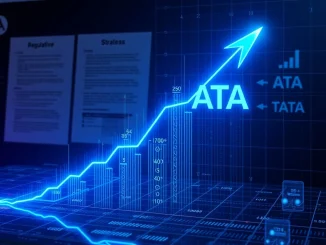
The world of digital assets is buzzing following a significant development from a familiar voice. Former U.S. President Donald Trump has reportedly urged the House of Representatives to rapidly pass a stablecoin regulation bill. This move signals growing political momentum behind efforts to establish clear rules for these digital currencies in the United States, adding another layer to the ongoing debate around stablecoin regulation.
Donald Trump Stablecoins: The Push for Swift Action
According to reports from JinSe Finance, citing Jin10.com, Donald Trump has made a direct appeal for the House to fast-track legislation aimed at governing stablecoins. This intervention from a prominent political figure underscores the increasing importance policymakers are placing on integrating digital assets into the existing financial framework.
Trump’s remarks come hot on the heels of legislative progress in the Senate. The Senate recently gave its nod to the GENIUS Act. While the specifics of the bill Trump is referencing for the House might differ, the underlying theme is clear: a push for regulatory clarity for stablecoins.
Why a US Stablecoin Bill is Gaining Traction
Stablecoins are designed to maintain a stable value relative to a specific asset, often the U.S. dollar. They play a crucial role in the crypto ecosystem, facilitating trading, lending, and increasingly, payments. Their growing use has attracted regulatory attention due to concerns about:
- Financial Stability: Ensuring stablecoins are truly stable and don’t pose risks to the broader financial system if an issuer fails.
- Consumer Protection: Safeguarding users from potential fraud, mismanagement, or lack of transparency regarding reserves.
- Illicit Finance: Preventing the use of stablecoins for money laundering or other illegal activities.
A clear US stablecoin bill is seen by proponents as necessary to foster innovation responsibly while mitigating these risks. The lack of a comprehensive federal framework has been a point of uncertainty for businesses and investors alike.
Understanding the GENIUS Act and Broader Stablecoin Regulation Efforts
The Senate’s recently approved GENIUS Act provides a glimpse into the type of stringent requirements being considered for stablecoin regulation. Key provisions include:
- Mandatory Licensing: Issuers would need specific licenses to operate.
- Full Reserve Backing: Requirements for stablecoins to be fully backed by high-quality, liquid assets.
- Annual Audits: Mandatory audits, particularly for larger issuers (e.g., those with a market cap over $50 billion).
- Regulatory Oversight: Provisions extending oversight to foreign entities issuing stablecoins accessible in the U.S.
These measures reflect a global trend towards imposing stricter rules on stablecoin issuers to ensure transparency and stability. While the House bill Trump is advocating for might have different details, it is expected to address similar core concerns.
Implications for Crypto Regulation US
Donald Trump’s call for rapid passage injects a significant political element into the legislative process. It could potentially accelerate the timeline for House consideration of stablecoin legislation. However, the path to a final law involves reconciling potential differences between any House bill and the Senate’s GENIUS Act.
The broader landscape of crypto regulation US is complex, involving multiple agencies like the SEC, CFTC, and Treasury. A stablecoin bill would be a major piece of this puzzle, providing specific rules for this class of digital assets, distinct from volatile cryptocurrencies like Bitcoin or Ethereum.
Challenges and Opportunities Ahead
Passing comprehensive stablecoin legislation presents both opportunities and challenges:
Opportunities:
- Increased clarity for businesses and developers.
- Potential for greater institutional adoption.
- Enhanced consumer and investor confidence.
- Establishing the U.S. as a leader in responsible crypto innovation.
Challenges:
- Balancing regulation with fostering innovation.
- Defining what constitutes a stablecoin and how different types (fiat-backed, algorithmically backed) should be regulated.
- Implementing effective oversight without stifling growth.
- International coordination on standards.
The details of the proposed House bill and how it aligns or differs from the GENIUS Act will be critical points of discussion.
What’s Next for the US Stablecoin Bill?
With Trump’s reported urging, attention now turns to the House of Representatives. Will they indeed fast-track a bill? What will its specific provisions be? If both the House and Senate pass different versions, a conference committee would be needed to reconcile them before a final bill could be sent for presidential assent.
The journey towards a definitive US stablecoin bill is ongoing, marked by significant milestones like the Senate’s GENIUS Act and now, a notable push from a former President. The outcome will have lasting implications for the crypto industry and the future of digital finance in the United States.
Summary
Donald Trump’s call for swift House passage of a stablecoin regulation bill underscores the growing political urgency surrounding digital asset regulation in the U.S. Following the Senate’s approval of the stringent GENIUS Act, which proposes strict rules for stablecoin issuers, the focus shifts to the House. Establishing clear stablecoin regulation is viewed by many policymakers as essential for financial stability and consumer protection. The path forward involves navigating legislative processes and reconciling different approaches, but the momentum towards a comprehensive US stablecoin bill appears to be building, shaping the future of crypto regulation US.



